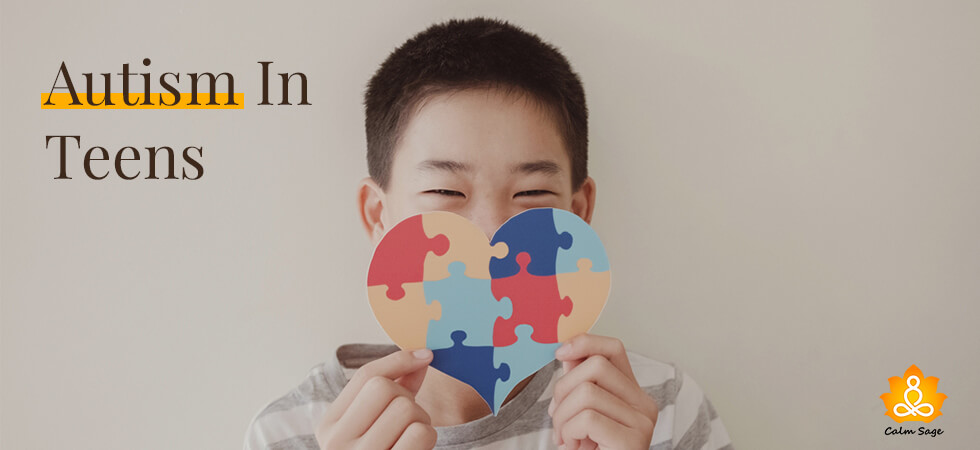Autism In Teens: What You Need To Look For & How To Support Your Teenager With ASD

Parents watch their toddler grow into a tween with anticipation but when their tween turns into a teenager, parents experience a twinge of anxiety. And this is all without factoring autism into the equation.
Teenagers go through the typical behavioral and hormonal changes not add in a developmental and social disorder and the typical teenage years become a live minefield of social and behavioral struggles.
In this article, you’ll discover the common signs of autism in teens, what to expect, and how you, as parents, guardians, or teachers, can support an autistic teenager.
Autism In Teenagers
Autism Spectrum Disorder or ASD is the term that can be used to describe the range of neurological and developmental conditions that can be perceived through changes in behavior, social interactions styles, and communication.
Autism is a spectrum disorder as the outward symptoms of autism can vary in severity – from mild, moderate, and severe. In the DSM-5, the criteria for diagnosis of ASD there are some key signs of autism but can vary from person to person.
Some symptoms of autism may also change as a person ages. What someone may have experienced as a child might be different from what they may have experienced as a teenager or an adult.
Let’s begin by understanding some of the common signs of autism in teenagers.
Signs Of Autism In Teens
As I previously mentioned, the outward signs of ASD may differ from person to person but there are some common signs of autism in teens such as behavioral and social changes that you need to look out for:
1. Difficulty In Interaction & Communication: An autistic teenager may face trouble with social interaction and communication with others such as trouble holding conversations or misunderstanding social cues and body language.
2. Having A Restricted Pattern Of Behavior: An autistic teenager may also have a restricted pattern of behavior such as repetitive functions, strictly following the same routine every day, etc. Any disruption in their pattern may leave them feeling distressed and agitated.
3. Challenges In Adjusting To Social Norms: Autism signs in teens may also occur in the form of difficulty in adjusting to social norms as expected.
4. Difficulty In Sensory Processing: An autistic teenager may also experience trouble with sensory processing as well such as finding the noise at school too much or overwhelming, inability to cope in crowded places, etc.
5. Difficulty With Understanding Emotions: Another sign of autism in teenagers can be difficulty in processing emotions. A teen with ASD might have low self-esteem, difficulty in labeling their emotions, excessive anxiety, low mood, wanting to withdraw from the outside world, etc.
Some teens with ASD have mild symptoms but some teens with autism may experience severe symptoms that may disrupt their ability to the standard social and behavioral norms.
If your teen shows the signs of autism, it is recommended you get a professional diagnosis immediately. A diagnosis can help you get the right treatment and access to the right resources you need to support your teen with ASD.
Signs of autism can change. Autism is diagnosed keeping in mind the changes in behaviors. Of course, there is no exact age where the signs may be visible in your teen. However, most behavioral, social, and emotional changes occur during the puberty years (11-13 years).
ASD signs may also come into notice when a teen starts school and when social relationships become a central aspect of a teen’s life.
How To Support Your Teen With ASD?
Please remember that autism cannot be cured. ASD is a part of a person’s life, development, and personality. However, with the right resources, you can learn to support someone struggling with ASD.
The first thing you need to do is find the right psychiatrist, one who specializes in ASD. Only a professional and trained psychiatrist, psychologist, or pediatrician can do an official diagnosis.
Just as the signs may differ, so does the outlook. The important thing to understand here is that your teen isn’t impaired or invalid. And while their life may be challenging, with the right resources, they can learn to live happy and healthy lives.
Here’s how you can support your teen with autism:
1. Educate Yourself
There are many misconceptions when it comes to autism or ASD. As a parent or a guardian, you need to talk to a psychiatrist or a psychologist to know more about ASD and its signs. How will you advocate for your teen’s rights if you don’t understand what ASD is? Read. Talk. Listen.
2. Get To Know Your Teen
Most parents with an autistic teenager may not understand the extent of their teen’s condition. If you can’t figure how to help your teen, ask! Maintain an open and honest conversation with them. Observe their behavior, ask them about their feelings, and understand their triggers. Get to know them emotionally, socially, and mentally.
3. Accept Their ASD As It Is
No matter what the media or others say about autism or ASD, you need to understand that there is nothing wrong or invalid with your teen and their ASD. All they require is your love and support. As a parent or a guardian, you can show your support by validating them, respecting their boundaries, and giving them space when they ask.
4. Be Supportive
You need to understand that autism does not just “go away”. It represents your teen’s personality, cognitive functioning, emotional processing, and overall development. There will always be pressure from others to fit into the standard social norms. As a parent or guardian, you need to be supportive of your teen’s condition and not put pressure on them to change their behavior.
To further understand your teen’s symptoms of autism and how you can help them, you can consult with a psychiatrist, if your teen has speech impairment you can consult a speech therapist, to help with your teen’s behavioral changes you can consult a behavioral specialist, and you can also consult with a nutritionist to get help with managing your teen’s diet.
Final Thoughts
Autism or Autism Spectrum Disorder is not a curable disorder but with the right diagnosis and resources, someone with ASD can learn to live a happy and healthy life.
There will be challenges in life but it is important to make your teen feel accepted, loved, and validated. A parent’s support can mean a lot to a child. Be sure you get the right support for them as well as for yourself.
For more, you can reach out to your therapist or write to us at info@calmsage.com. You can also follow us on social media for more content on ASD.
I hope the above information helped you understand the signs of autism in teenagers and how to support your teen with ASD. If you found this article useful, let us know your thoughts in the comments below!
Take Care!




















